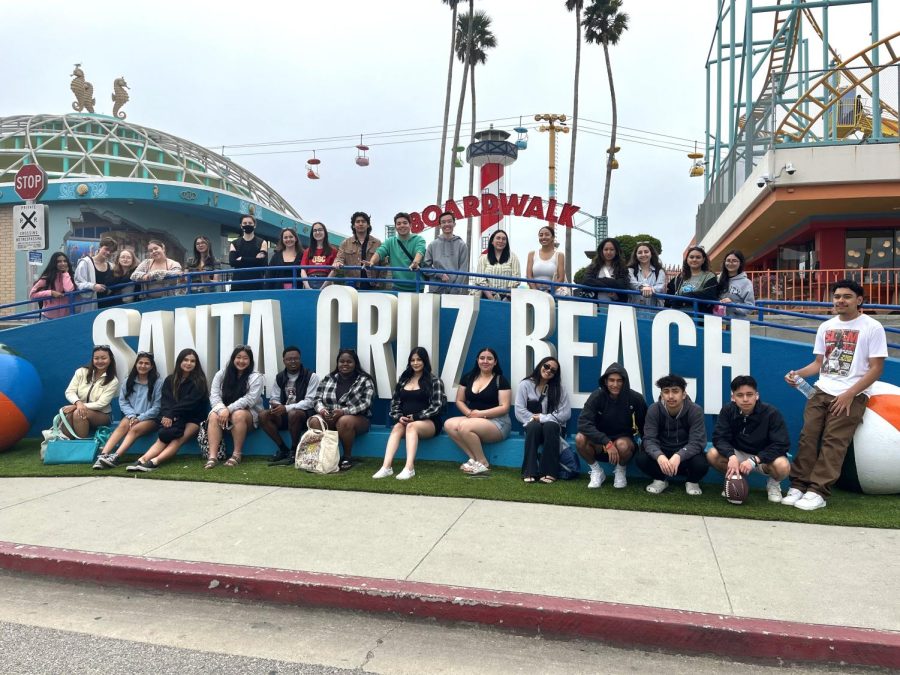SENIOR SECTION: AVID Seniors: Paving the path to success as first-generation college students
SCHS’s AVID seniors take a celebratory end-of-year trip to honor their high school accomplishments.
In the 2022-2023 school year, 100% of SCHS seniors in the AVID program were accepted into four-year universities, becoming first-generation college students.
According to the Pew Research Center, only 26% of people aged 22 to 59 whose parents have not obtained a college education have a bachelor’s degree. The AVID program seeks to aid first-generation students and provide them with support they might not have otherwise.
Senior Bryan Hernandez will be majoring in electrical or mechanical engineering in the fall and sees attending a university as a way to achieve his dreams.
“It (going to college) is an accomplishment, something I imagined achieving since I joined AVID,” Hernandez said. “I can make my parents proud and change that financial need to a better generational cycle.”
AVID teacher and site coordinator Risha Shah believes the program focuses on skills that students will find useful throughout life.
“It’s a whole package,” Shah said. “We talk about financials, about banking, accounting, budgeting and things that students can take away from their high school years and apply to life beyond high school.”
A first-generation student herself, Shah finds the most rewarding part of coordinating and teaching AVID is being able to give students the support they need.
“There’s so much to learn from every individual in this program,” Shah said. “They all bring something different to the table. It’s really nice for me to help students get to where they want to be and provide them with the resources that they may not be getting from home.”
Senior Rooney Herrera will be majoring in pre-business at the University of California, Riverside. For Herrera, AVID opened up an opportunity to grow outside of his comfort zone.
“I participated in some school activities because AVID encouraged me to,” Herrera said. “(With) community service, I don’t think I would have exceeded the 20 hours (and obtained) 100 plus hours.”
Senior Samantha Flores is attending the University of Hawaii at Mānoa to study biomedical engineering. She believes AVID helped her to attend different events, where she was introduced to new communities.
“All my AVID teachers that I’ve had really pushed me to go to these events and to kind of explore my interests,” Flores said. “It pushed me to do a lot of community service, meet new people, go to events that I wouldn’t go to by myself, and I think through that, I definitely did make a lot of friends.”
Senior Kasandara Carrasco is attending De Anza College to study nursing. Being a first-generation student, she said, can bring a unique set of challenges after college acceptance. Carrasco’s parents have been supportive of her goals, but being a first-generation student can create pressure to succeed.
“It’s a little stressful because all of them (family members) depend on me,” Carrasco said. “They’re like, ‘Okay, well you have to do this. You’re going to be the first one to do this. You have to make us proud.’”
Attending college can open up new opportunities. Herrera hopes what he gains will make his family proud.
“They came from El Salvador, and they’re trying to give me a better life,” Herrera said. “I’m trying to make them proud and go into college and be able to repay them with the money I get from my career.”
Similar to Carrasco, senior Michelle Sanchez is attending De Anza College to study nursing. She explained that AVID helped her reach her goals.
“It’s a little bit of pressure, but it’s rewarding knowing that you will go to college and take advantage of the opportunities my parents and other families didn’t have,” Sanchez said. “(When my family found out), they were happy. They just knew that I would go to college either way.”
Counselor Katy Weeks works with the class of 2023 AVID cohort. She believes the AVID program is helpful not just for the students, but the school as a whole.
“It gives us another group of student leaders and student ambassadors,” Weeks said. “They’re just such a caring group of students.”


